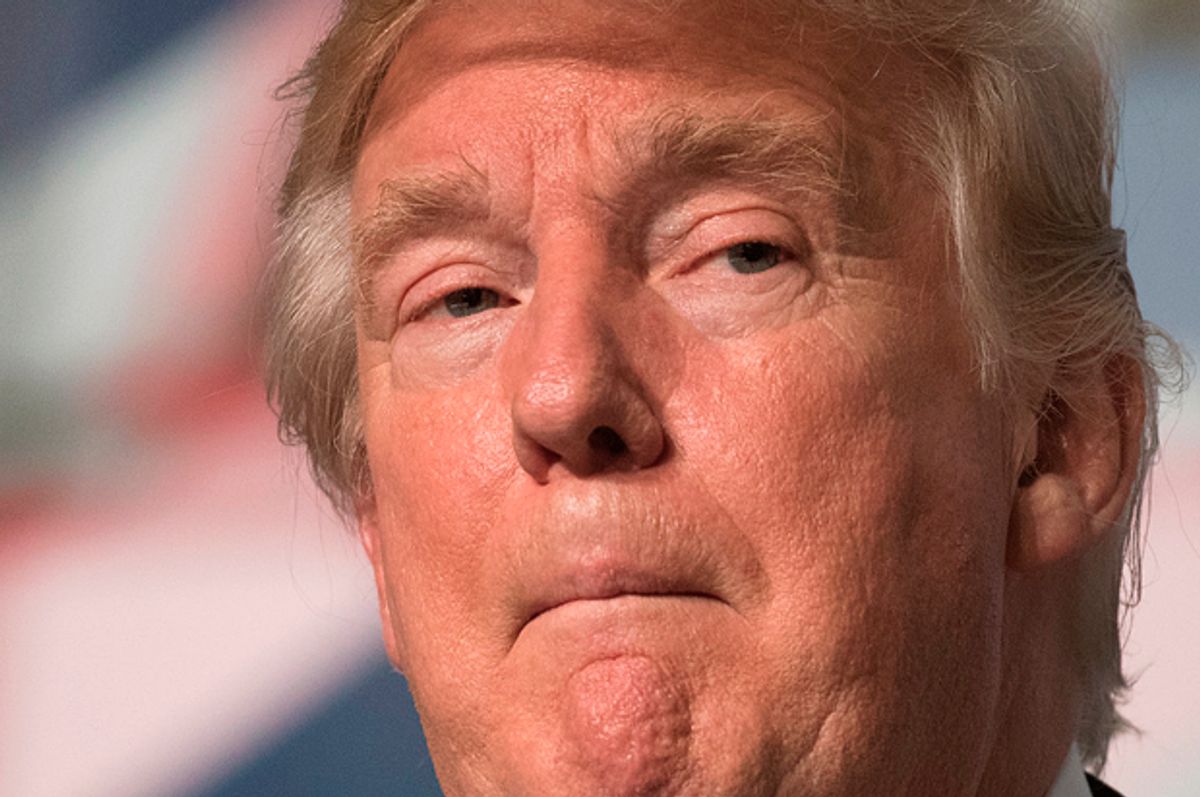Politico’s “Political Caucus” is back at it again — providing a wildly baseless prediction on the performance of Donald Trump that is likely wrong.
Undeterred by the lesson Republicans should have learned after clinging to the fantasy that polling in 2012 only had to be "unskewed" to show a Mitt Romney win, Politico's Republican “insiders” are now claiming that polls showing the GOP nominee trailing rival Hillary Clinton aren't accounting for "secret" Trump support.
"More than seven-in-10 GOP insiders, 71 percent, say the polls understate Trump’s support because voters don’t want to admit to pollsters that they are backing the controversial Republican nominee," Politico reported Friday.
According to Politico's GOP insiders, there is a mass of “shy Trump” voters out there who aren't showing up in the polls that show Clinton's advantage expanding from must-win battleground states to traditionally red states across the country.
“I personally know many Republicans that won't admit that they are voting for Trump. I don't like admitting it myself," one unnamed Virginia Republican said. "It won't matter if Hillary is up more than 5 points, but we might be in for a surprise if Hillary's lead is less than 5 points on Election Day.”
Another Iowa Republican agreed. “I also believe that by polling likely voters rather than registered voters, polls are missing a lot of where Trump's support lies," the GOP operative told Politico.
Clearly, the promises of a "silent majority" finally roaring on election day has once again captured Republicans in a delusion as reality prepares to deliver a rude awaken in less than two weeks. Nate Silver's 538 election forecast model gives Clinton an 81 percent chance of winning the election.
As Salon's Matt Sheffield pointed out, the “missing white voters” the GOP insiders are counting on do exist, "but they don’t appear to be registering to vote this time around." And as David Wasserman of the Cook Political Report explained in June, these voters aren't likely to help Trump much as most of them don’t live in battleground states.
The disengaged white man that Trump needs to win the election, as polling indicates he may lose African-American, Latino, women and millennial voters by historic margins, simply don't appear interested in turning out on his behalf.
“The wave of new voters this year has dramatically favored the Democratic Party, according to TargetSmart, which analyzed the expected party preferences of the new registrants in 15 of the first- and second-tier presidential battlegrounds,” Politico recently reported.
“TargetSmart found that 42.6 percent of the new voters registered this year lean Democratic, and only 29 percent lean Republican,” Politico added. “Worse for the GOP, registration trended more Democratic in every single battleground state.”
At least one of Politico's Republican insiders gets that.
“In 2012 people said the polls were wrong because voters didn't want to sound like racists for not voting for President Obama. Polls weren't wrong. People on the losing side of the polls always invent a reason for it,” one Colorado Republican said.
For their part, the Trump campaign doesn't as seem lost in the fact-free world of unskewed polls and "secret" voters as the candidate would suggest. According to this week's Bloomberg profile of the campaign's operation in the final days before the election, Team Trump knows it's losing:
Despite Trump’s claim that he doesn’t believe the polls, his San Antonio research team spends $100,000 a week on surveys (apart from polls commissioned out of Trump Tower) and has sophisticated models that run daily simulations of the election. The results mirror those of the more reliable public forecasters—in other words, Trump’s staff knows he’s losing. Badly. “Nate Silver’s results have been similar to ours,” says Parscale, referring to the polling analyst and his predictions at FiveThirtyEight, “except they lag by a week or two because he’s relying on public polls.” The campaign knows who it must reach and is still executing its strategy despite the public turmoil: It’s identified 13.5 million voters in 16 battleground states whom it considers persuadable, although the number of voters shrinks daily as they make up their minds.



Shares